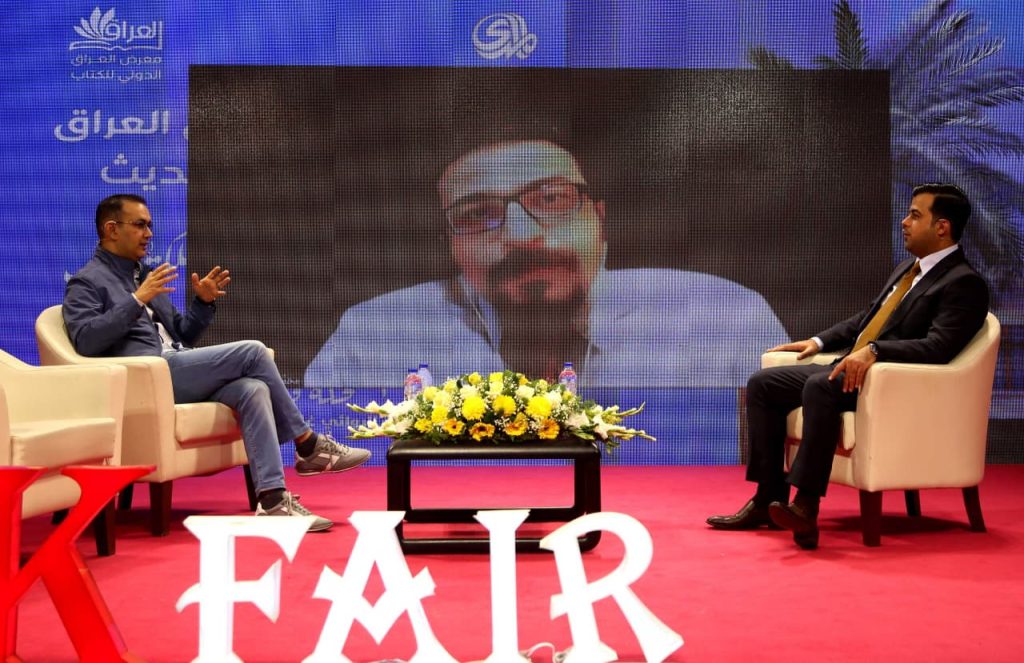
Harith Rasmi Al-Hiti
Photography by Mahmoud Raouf
Within the daily curriculum of seminars and events held on the grounds of the Iraq International Book Fair, the seminar hall hosted both the thinker Dr. Muhammad Hussein Al-Rifai (via Skype) and the political and academic analyst Dr. Iyad Al-Anbar to talk about political parties in Iraq between stereotypes and modernization, and it was moderated by the journalist Hossam Al-Hajj and attended by a large number of the public, which dealt with important axes and definitions for parties in general and the Iraqi ones, specifically.
After welcoming the guests of his session and the audience, the journalist Hossam Al-Hajj began his speech by thanking Al-Mada Foundation for this session and for the tremendous organization of this event, indicating that Baghdad needs in this period to open up cognitively and civilized, politically and culturally, to all neighboring and brotherly countries.
Al-Hajj bin that «talking about political parties is a long and broad talk and it can be said that political parties in Iraq are unique in their academic definition in a different and different way and perhaps contradictory with the customary in party organizations», believing that «political organizations in Iraq are in fact nothing but electoral groupings that flourish, remain and grow as much as they have political influence and existence, but they decline and gradually decay whenever they lose in the elections or retreat from them».
Al-Anbar said that «there is confusion in the description or academic description often collides with realistic approaches, and considering that the political situation in Iraq is in the scientific sense, we are in the transition stage to build a democratic state, all the harbingers of transformation are usually distorted, turbulent and even chaotic and this is very normal in such an experience, we are often faced with the problem of the standard concept and how it is converted to match the realistic description, this problem faces any researcher or anyone who wants to describe the reality of the partisan experience in Iraqism, especially after 2003, considering the transition from one dictatorial totalitarian party to multiple parties excessively, the main problem if we return to the definition of the party with the literature of social sciences and political science literature in particular, says a group of individuals meet in a certain organization according to a certain ideology whose goal is to reach power, participate in it or stay in it, then there are mechanisms related to organization and participation.
“When you come to apply this description to Iraq, you will find that the most accurate description that applies to political groups in Iraq is that their goal is to reach power, the rest of the criteria may be the subject of controversy in terms of their existence or not, here I am not talking about the legal aspect, as the law of parties exists, but its application has many problems, in Iraq we can call them political groups or political entities, but the description of parties will make us face the problem of political party divisions, and the latter is in The reality is usually divided into two parts, the first is structural parties and the second is mass parties, with regard to structural parties, all of them in Iraq are almost structural parties, as for the Jamahiriya, the fact that this only applies to two descriptions, the first is the Communist Party and the second description is the Sadrist movement.
For his part, the thinker Dr. Muhammad Hussein Al-Rifai «If we want to start with the concept of the party in a modern sense from within the field of sociology of politics about the party, we must deal with it as a community organization, meaning that it is based on seeking to participate in the exercise of power means entering the field of political action, and the party then understands that this organization associated with the concept of total or partial community means that each party takes it upon itself to represent its community or part of its society».
He added that «the societal project that any party must be based on is the project of building the state, but the difference about which state we are talking about, the state is based on society, and we have a crisis that we took these concepts without becoming societal, political and cultural, without the revolutions that occurred in the countries of law and politics».
Al-Rifai added that «our parties seek to reach power and when they reach this power, we make a mistake when we describe them as practicing corruption, and in fact they do not practice corruption, but rather practice a form of providing or creating conditions or conditions that can be independent from their popular base, they use the popular base and the masses in order to reach power, they use them in a way that is instrumental, we now have one of the best constitutions of the third world to practice democracy, but how did he take this constitution, and how In legislation, we cannot open the horizon to universality without having a real fight against illiteracy,” he said.
